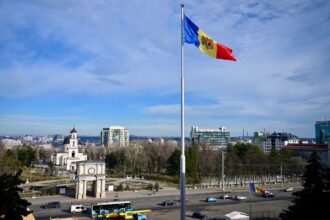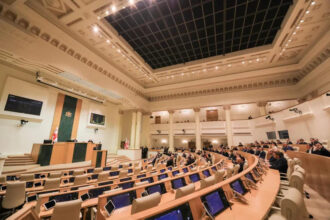On October 30, 2023, Rep. French Hill (Republican from Arkansas), Deputy Chairman of Committee on Financial Services and Member of Committee on Foreign Affairs as well as the Permanent Select Committee on Intelligence visited an exhibit of destroyed Russian vehicles on Saint Michael’s Square, Kyiv, Ukraine. (Eduard Kryzhanivskyi/Ministry of Foreign Affairs of Ukraine/Global Images Ukraine via Getty Images)
Members of Congress and Congressional Advisors told The Kyiv Independent that a series of logistical restrictions on U.S. Congressional member’s travel to Ukraine has increased concerns about the effectiveness of American diplomatic efforts in Kyiv.
Since Russia’s full scale invasion of Ukraine in February 2022, U.S. Congress members have shown their support for the allied cause by making frequent visits to Kyiv. These trips are usually widely photographed.
The U.S. State Department, citing security concerns does not allow congressional staff or representatives to spend the night in Ukraine during official congressional travel.
After about seven hours’ work, the representatives will fly to western Poland, take a overnight train from Washington to Kyiv and then leave for Poland by nightfall.
There are growing concerns that safety protocols may be limiting the potential expansion in support for Kyiv at Washington.
Advocates and lawmakers say that with the American presidential elections less than a week away and the Republican ticket led by former President Donald Trump who has expressed skepticism about further support for Ukraine, the best way to ensure Congress will allow further aid to Kyiv would be to allow members of Congress the ability to make longer trips to Kyiv.
Advocates and legislators say that the best way to ensure Congress approves further aid for Kyiv is to allow members of Congress to make longer trips to Kyiv.
The more politicalized questions about aid to Ukraine in the elections become, the more worried people are that the window of opportunity for effective bipartisan diplomacy has passed without being fully taken advantage of before the imminence of the election set in this summer.
Rep. Jimmy Panetta said, “It is ridiculous.” Panetta has made many visits to Kyiv. “It is great to show Ukraine that we are behind them, but for members of Congress it is not great to get a real education and experience when it comes building this argument and the necessary support for Ukraine.”
A Congressional advisor, who is familiar with these trips and spoke on condition of anonymity, said that more representatives, particularly those not fully supportive of Ukraine, would go to Ukraine if there weren’t restrictions. They’d see the trip as more worthwhile.
The advisor said, “It is frustrating that we are not allowed to spend more time in Kyiv in order to get a feel for what’s going on in the minds of people, not just in Kyiv but also in other places.” “Time and attention are valued here as currency.”
Privately funded trips
Rep. Panetta and others have become dependent on private sponsored trips because of these restrictions, which are common during wartime for U.S. government members.
When groups such as the Atlantic Council, UN Refugee Agency and Center for Strategic and International Studies sponsor a trip, representatives can stay in Ukraine for several days and travel outside of Kyiv.
These multi-day visits often include visits to Kharkiv, Odesa, and other locations. They allow representatives to gather what Rep. Panetta believes is the most effective information and message to bring back to non-supportive Members of Congress.
Rep. Panetta said that “I believe it is necessary to understand Ukraine” if you actually get on the ground, stay on the ground, and have the conversations and experience.
“I believe that it is essential to understand (Ukraine) to get in, get on the ground, stay on the ground, and have the conversations and experience necessary.
Privately sponsored trips are required to have six hours of meetings each day. This is not the case for official congressional travel. The advantage of the condensed trips is that the meetings are usually at the highest level, since they are organized through the U.S. embassy in Kyiv.
The State Department and U.S. embassy in Kyiv declined to comment on the request for a statement, citing security concerns.
The U.S. Embassy in Kyiv, which is also under Washington’s restrictions, has not returned to its pre-full scale invasion staffing. Elizabeth Hoffman, CSIS Director of Congressional and Government Affairs, says this contributes to a limited number of congressional visits that are resource and time-intensive for embassy.
Hoffman said that as a measure of security, every U.S. Government employee who enters Ukraine must have a colleague based in Ukraine temporarily relocate outside the country for the duration the staff member’s stay.
The U.S. Embassy at Kyiv declined comment on whether or not this policy is still in place.
Staffers from several congressional offices visited Ukraine in early October on CSIS’s 4th sponsored trip. The first trip was self-financed, and the second was funded by grants from the Howard G. Buffet Foundation.
CSIS, who said that they initiate the trips and contact members of Congress in order to not take the same member twice again, declined, however, to disclose the costs of such trips. Hoffman said that after accounting for security and logistics measures by an external company, each trip costs less than $100,000.
There is another option, based on an old law, that is usually available to members of Congress but is not allowed for diplomacy.
The U.S. and nearly 90 countries have an agreement that allows foreign governments sponsor the travel of U.S. officials in the name cultural exchange. These agreements are easy to use and come with minimal restrictions. They also require the State Department to sign off.
The Mutual Educational and Cultural Exchange Act of 1962, a law that dates back to 1961, includes countries like Yemen, Venezuela, Georgia and Azerbaijan.
The Ukraine has never signed a MECEA with the United States, so the Ukrainian government cannot sponsor cultural and educational tours for U.S. officials. The only options are official or privately funded trips, which require extensive documentation and preapproval from the House and Senate Ethics Committees.
Some foreign policy experts in Washington have the impression that the restrictions are comparable to the widespread fears of the current administration about an escalation between Russia and the United States. The worry is that the more U.S. personnel there are, the more Russia will perceive it as American involvement.
Some people even think that the tightening up of diplomacy in Ukraine, which has been going on since 2012 when four Americans, including the U.S. Ambassador to Ukraine, were killed. J. Christopher Stevens was killed in Benghazi.
Others see these limitations as smart safety precautions and common wartime protocol. Advocates for Ukraine in Washington insist that there is no substitute for Americans on the ground in Ukraine.
“The ability for members of Congress and their staff to travel to Ukraine, to see the spirit and resilience of the Ukrainian people, and to experience a small taste of what they experience on a day-to-day basis is the most persuasive and powerful advocacy tool available,” Scott Cullinane said.
“There is nothing comparable to help people in Washington understand the situation and be convinced of Ukraine’s just cause.”
Razom is a 501(c), which means that, despite being one of Ukraine’s largest advocates in Washington, they are unable to sponsor congressional visits to Ukraine.
Cullinane stated that “there’s no substitute, no replacement for physically going to Ukraine and being present, even if only for a few short days.”
Read More @ kyivindependent.com




